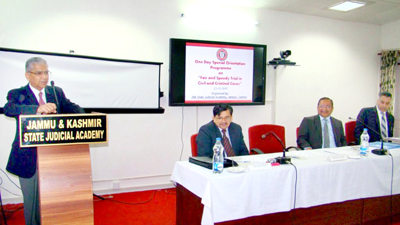
Excelsior Correspondent
JAMMU, Dec 23: Chief Justice of State High Court Justice Badar Durrez Ahmed today stressed the need of evolving innovative ideas on proper and effective time management in the courts.
In his inaugural address at one day orientation programme on “fair and speedy trial in civil and criminal cases” organized by J&K State Judicial Academy, Chief Justice said, “the duty of a judge is to deliver justice to the parties. Proper time management by the trial judge will surely help to cut down the delay but while ensuring speedy trial a judge has a duty of care and caution to ensure that fair procedure is observed”.
“We must devise new technology to save the wastage of time spent on execution of summons and processes. Lengthy cross-examination of witnesses by the lawyers has to be curtailed”, the Chief Justice said, adding “if the cross-examination goes on endlessly, the judge should know how to cut it down”.
“A judge should also keep in mind as to how much actual time is spent on the case and in this direction we must think and come out with new ideas to reduce the time which is not actually spent on the case”, Justice Ahmed said, adding “we have to expand our parameters and come up with innovative ideas on proper and effective time management”.
Dr Justice S Muralidhar, Senior Judge, Delhi High Court highlighted the fundamental principles of fair and speedy trial in civil and criminal cases. He emphasized that at the time of granting police or judicial remand to the accused, the judge has to be aware that he is discharging constitutional duty envisaged under Article 21 and 22 of the Constitution.
“Similarly, order of sentence has to be very careful as the rights of the accused, victim and interest of the society is determined in the sentence. A trial judge shall remain always alive to the difficult circumstances faced by women, children, disabled, old-aged, poor and downtrodden sections of the society in the court system”, he said, adding “they have to be provided a level playing field in the process of fair trial”.
Justice Alok Aradhe, Chairman, J&K State Judicial Academy, in his special address, gave overview of the training programme and said that speedy justice and fair trial to a person accused of a crime are integral part of Article 21.
“These are imperatives of the dispensation of justice. In every criminal trial, the procedure prescribed in the code has to be followed, the laws of evidence have to be adhered to and an effective opportunity to the accused to defend himself must be given”, he said.
Earlier, the training programme was inaugurated by the Chief Justice along with Justice Alok Aradhe and Dr Justice S Muralidhar. All the Munsiffs of Jammu Province participated in the programme.
The proceedings were conducted by Abdul Rashid Malik, Director, State Judicial Academy.
Justice O P Sharma, former Judge, High Court of J&K, D C Raina, Senior Advocate, and Abdul Rashid Malik, Director Judicial Academy deliberated upon minimizing procedural delays in civil cases. The judicial officers interacted with the resource persons.

